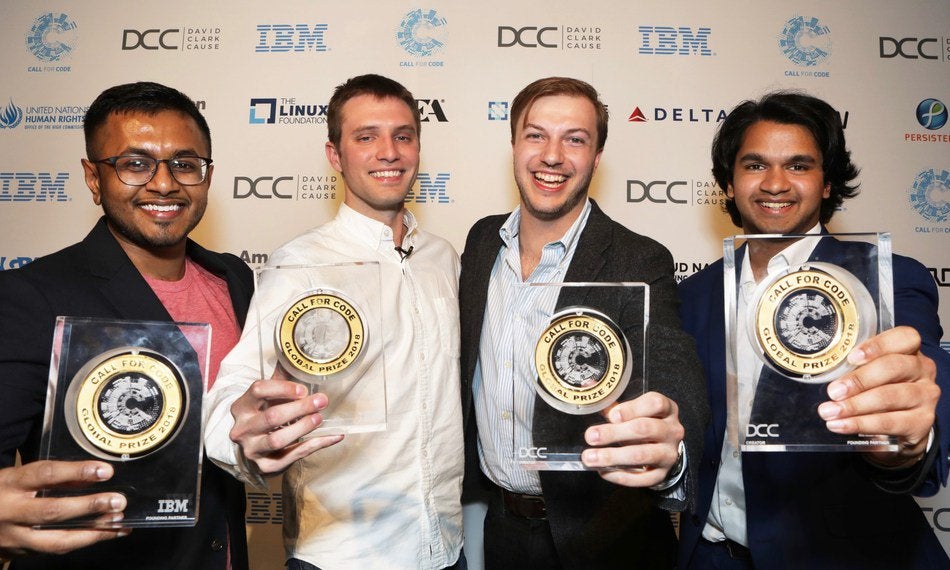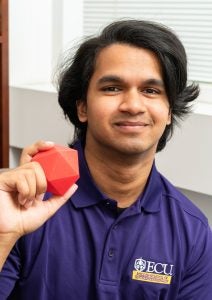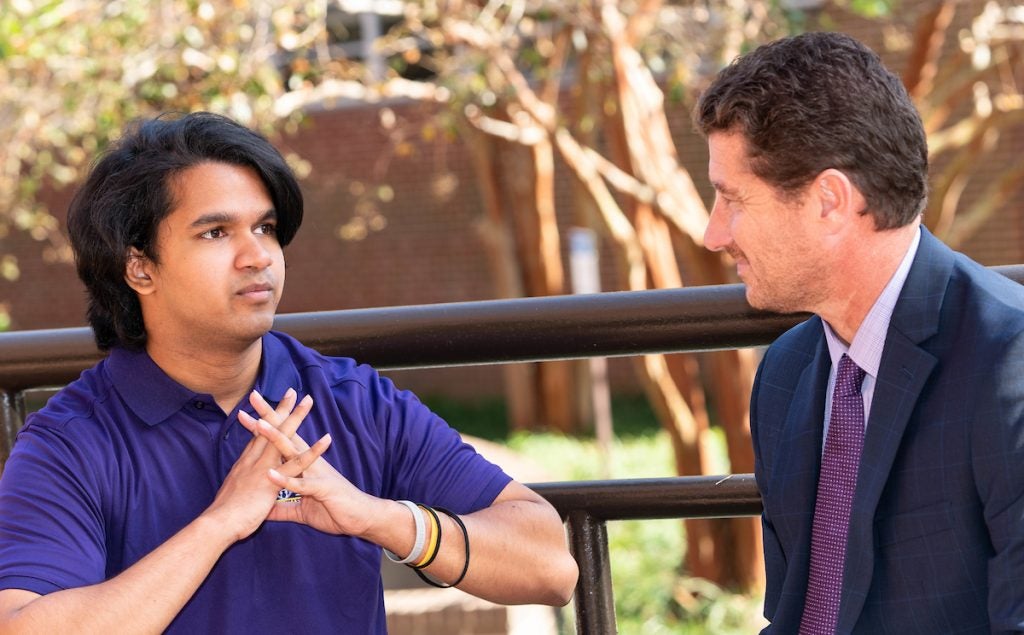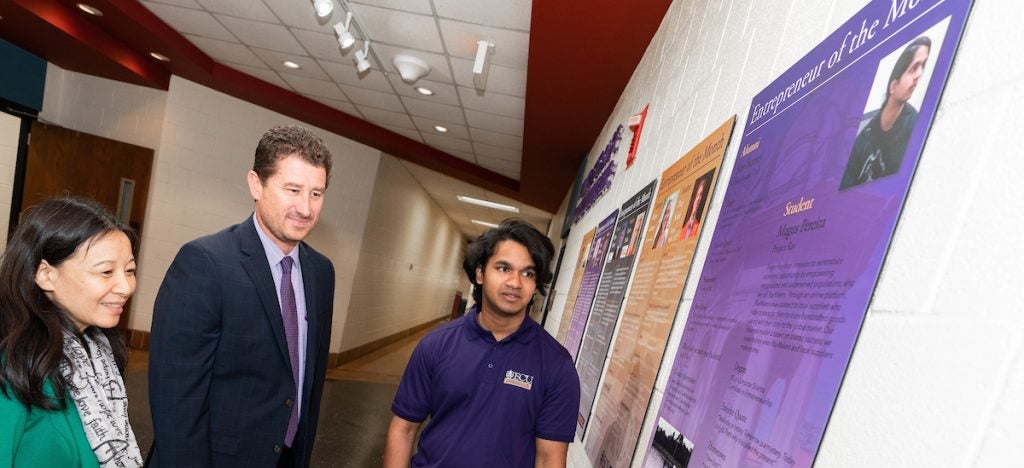November 13, 2018
Winning Combination
Miller School Alumnus and Computer Science Graduate Wins IBM’s Global Call for Code Challenge

Miller School alumnus Magus Pereira, far right, was part of a team that won IBM’s first Call for Code Challenge, a competition whose inaugural theme focused on natural disaster preparedness and relief. The winning team also included, pictured left to right, Taraqur Rahman, Bryan Knouse and Nick Feuer. (Photo by Call for Code)
Thanks to skills acquired as an East Carolina University computer science graduate, access to resources that encourage innovation, and mentorship and business planning from the Miller School of Entrepreneurship, Magus Pereira is one step closer to being a true social innovator.
Pereira, along with his team which included four innovators from across the United States, walked across the Regency Ballroom stage in San Francisco Oct. 29, 2018, and won the first global Call for Code Challenge for their solution to keeping people connected during a natural disaster named Project OWL, “Organization, Whereabouts and Logistics.”
Project OWL’s, team which includes Pereira, Charlie Evans, Nicholas Feuer, Bryan Knouse (team lead) and Taraqur Rahman, won $200,000 in cash prizes, product development by IBM and the opportunity to pitch OWL to venture capitalist firm NEA for potential funding. Judges for the competition included former President Bill Clinton and Jim Zemlin, Executive Director, The Linux Foundation.
Project OWL is a two-part hardware/software solution. It provides a communication infrastructure that gives first responders a simple way for managing all aspects of a disaster.
The devices resemble rubber ducks and can float in flooded areas if needed. The physical “ClusterDuck” network is made of hubs — DuckLinks, MamaDuck and PapaDuck — that create a mesh network that makes it possible for people to use their existing mobile phones or other devices to communicate with first responders. It can use systems like Alexa and Facebook Messenger to send lifesaving information even without a robust internet connection.
“Once this network of Ducks is deployed and then clustered, civilians are able to basically get on the devices through a really intuitive interface and contact first responders with a list of things that are really essential to them,” Pereira said.
This application, the OWL software incident management system, uses predictive analytics and multiple data sources to build a dashboard for first responders.
Over 100,000 developers and data scientists from 156 nations participated in the Call for Code Challenge, creating more than 2,500 applications. In addition to Clinton and Zemlin, other judges for the competition included Kate Gilmore, United Nations Deputy High Commissioner for Human Rights; Dr. Irwin Redlener, Director of National Center for Disaster Preparedness at the Earth Institute of Columbia University; Deborah Dugan, Chief Executive Officer, (RED); and Grace Kim, Design and Research Lead at Twitter.
From Pirates to Ducks
Pereira says his ClusterDuck idea came about while attending a makeathon in 2017 on ECU’s campus. The makeathon, sponsored by ECU’s Innovation Design Lab, wanted to address the disaster relief efforts that were taking place during the then-recent hurricanes.
“ClusterDuck wasn’t even my first idea,” said Pereira. “It was an idea called HexHale bins, hexagonal recycling bins for post-disaster clean up. I didn’t see it being impactful so (I) scrapped (sic) and ideated what is now ClusterDuck.”
From there Pereira began to take his ClusterDuck idea out to the ECU community. To make the concept stronger, he sought input from ECU’s Office of Innovation and New Ventures, participated in Greenville-area pitch competitions and worked with other like-minded students in several student organizations.
He also leaned on the resources available in the Miller School of Entrepreneurship, where he worked with faculty on the ideation of ClusterDuck, its business plans and the business model canvas. The inaugural Pirate Entrepreneurship Challenge (PEC), established by the Miller School, offered Pereira another opportunity to pitch ClusterDuck; it advanced to the final round of the competition.
Pereira took advantage of additional pitch opportunities available through the Miller School. He pitched ClusterDuck to one of the school’s advisory boards, where he was encouraged and received constructive criticism.
“One of the services the Miller School provides is linking our future entrepreneurs with the right competition when it comes along,” said Dr. Mike Harris, director of the Miller School of Entrepreneurship. “The TCU competition was another step to get him ready for Call for Code.”
Along with applicable knowledge, curriculum and opportunities, the Miller School also provided Pereira with morale support. After failing to win early competitions, and preparing for his graduation, Pereira thought about shutting down his ClusterDuck idea.
“I was beginning to shift slightly and transition to another idea, but I was encouraged to keep working on ClusterDuck … took advise and criticisms from my prior competitions. Then I found the Call for Code competition,” said Pereira. “I fixed and made revisions for this competition.”
“It’s very common for emerging entrepreneurs to encounter obstacles as they develop their ideas,” added Harris. “However, we all saw his passion and knew he had the resiliency to keep moving forward.”
Twenty-four hours before the Call for Code award announcement, Pereira met his team for the very first time. Four months prior, after learning about the Call for Code competition, he had reached out on Slack, a virtual, collaborative workspace, to find possible team members with similar aspirations to be social innovators. There, he first met team member Knouse, who led the development of the software dashboard/incident management system, complementing Pereira’s hardware capabilities. The team eventually grew to five. Each team member brought their strengths together, and from this collaboration, OWL was born.
Now, the team is on the verge of introducing a product that can save lives during a natural disaster.
Pereira believes his success so far was made possible by the skillsets he learned while in ECU’s department of computer science and by getting involved outside the classroom. He believes others could do the same.
“We are so proud to see our student win such a significant competition at the national level,” said Dr. Qin Ding, ECU associate professor in computer science. Ding had Pereira in two of her classes and was the founder and advisor for the Association of Computing Machinery, of which Pereira was a member. “It (Call for Code win) has also demonstrated that the education we provided for our students has prepared them well.”“Take your skill sets and get involved,” Pereira advises future students. “You have all this support available to you (at ECU), and there are a lot of creative minds around you. It’s a win-win situation.”
“Magus has demonstrated imagination and creativity in using his computer science education to find an innovative solution to a challenging problem,” said Dr. Harry Ploehn, dean of ECU’s College of Engineering and Technology. “I’m even more impressed by his determination and resourcefulness in using hackathons, the Pirate Entrepreneurship Challenge, and the IBM Call for Code contest to turn his innovation into successful entrepreneurship. What Magus has accomplished is truly remarkable and shows that we’re on the right track with our innovation and entrepreneurship initiatives here at ECU.”
Pereira said it was Project OWL’s goal to deploy the product before the next natural disaster. Pereira is the first Miller School of Entrepreneurship alumnus to win a major national competition.




